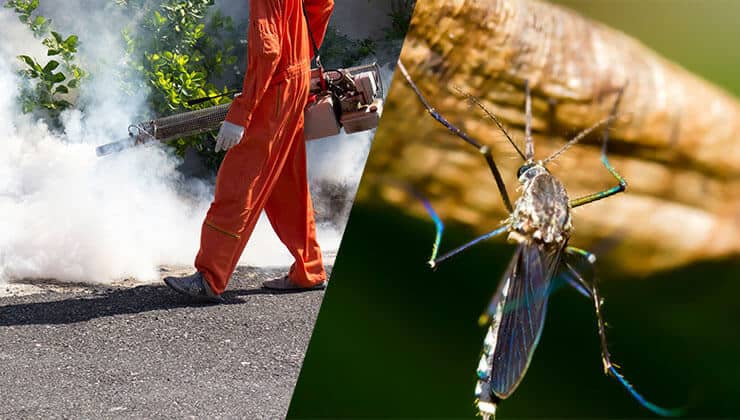New Jersey, with its diverse climate and abundant water bodies, is a hotspot for mosquitoes during the warmer months. As residents prepare for the inevitable surge of these pests, understanding effective mosquito control strategies becomes crucial. This article explores the challenges specific to New Jersey, reviews various control methods, and offers guidance on finding local mosquito control services.
Trust the expertise of our top-rated mosquito control services in Central New Jersey for comprehensive and dependable mosquito elimination. Our seasoned professionals utilize advanced techniques and environmentally-friendly solutions to protect your home and family from the nuisance and health risks posed by mosquitoes. Don’t let mosquitoes take over your outdoor spaces—take action today. Contact us to schedule a consultation and see why we are the premier choice for mosquito control in Central New Jersey. Call now and enjoy a safer, mosquito-free environment where you can relax and entertain without worry.
The Mosquito Menace in New Jersey
Mosquitoes are not just a nuisance; they are also carriers of various diseases such as West Nile Virus, Zika, and Eastern Equine Encephalitis, which can have serious health implications. In New Jersey, the dense population and humid climate create an ideal breeding ground for mosquitoes. The state’s extensive wetlands, including the Meadowlands and the Pine Barrens, further exacerbate the situation, offering ample breeding sites.
Mosquito control in NJ is a critical public health function due to the pests’ ability to transmit diseases such as West Nile virus and Zika. The state employs a variety of strategies to manage mosquito populations, including larvicidal treatments to water bodies where mosquitoes breed and adulticidal sprays in areas of high activity. Local county mosquito control agencies use environmentally friendly practices and encourage public participation through education on preventive measures like eliminating standing water. These integrated pest management approaches ensure effective control while minimizing environmental impact, helping to keep New Jersey’s public spaces and residential areas safer and more comfortable during mosquito season.
Understanding Mosquito Behavior
To effectively control mosquitoes, it’s essential to understand their behavior. Mosquitoes require standing water to breed, so they are particularly prevalent near ponds, marshes, and any areas where water can accumulate, such as clogged gutters and old tires. They are most active during dusk and dawn, although some species are daytime feeders.
Professional Mosquito Control Services in New Jersey
For those looking for professional mosquito control solutions in New Jersey, there are numerous reputable services that offer various treatment plans to suit different needs. These companies typically provide:
- Initial Inspection: This involves a thorough examination of the property to identify breeding grounds and potential problem areas.
- Larvicide Treatments: To prevent mosquito outbreaks, professionals apply larvicides to water bodies where mosquitoes breed. These treatments target the larvae before they can mature into adults.
- Adulticide Treatments: These involve the application of chemicals to kill adult mosquitoes. This method is often used during peak mosquito season or after a significant rise in mosquito activity.
- Natural and Organic Options: For those concerned about the environmental impact of traditional pesticides, many New Jersey mosquito control services offer natural and organic treatment alternatives.
- Integrated Pest Management (IPM): Some services adopt IPM practices, which combine physical, biological, and chemical tools to minimize mosquito populations effectively and sustainably.
DIY Mosquito Control Methods
For those who prefer to tackle mosquito control themselves, there are several effective DIY methods:
- Remove Standing Water: Regularly check your property for standing water and eliminate it. This simple step can significantly reduce mosquito populations.
- Use Mosquito Dunks: These are small, doughnut-shaped products containing Bti, a bacterium that is harmless to humans but deadly to mosquito larvae. They can be placed in ponds, bird baths, and other areas with standing water.
- Install Screens: Ensure that windows and doors have tight-fitting screens to prevent mosquitoes from entering the home.
- Use Fans: Outdoor fans can help keep mosquitoes away, as they are weak flyers and struggle against strong wind.
- Plant Mosquito-Repellent Plants: Certain plants like citronella, lavender, and marigolds are known to repel mosquitoes. Planting them around your home can help keep the pests at bay.
Environmental Considerations
When implementing mosquito control measures, it’s essential to consider the environmental impact. Chemical treatments, while effective, can harm non-target species and pollute waterways. Natural predators such as bats and dragonflies can also help control mosquito populations and should be encouraged in the local ecosystem.
Community Efforts in Mosquito Control
Mosquito control is most effective when the whole community participates. New Jersey residents can join or initiate community efforts to clean up neighborhoods, clear standing water, and share information on preventing mosquito breeding. Local health departments often provide resources and support for community-led initiatives.
Keeping Up with Local Mosquito News
Staying informed about local mosquito threats is crucial. New Jersey’s county mosquito control units often provide alerts and updates about mosquito surveillance and control activities in the area. Following these updates can help residents stay proactive about mosquito control.
Finding Local Mosquito Control Services
When searching for “mosquito control near me” in New Jersey, consider the following:
- Look for Licensed Professionals: Ensure that the service provider is licensed and has good reviews from other residents in the area.
- Ask About Treatment Plans: Different homes and areas may require different strategies. Discuss your specific needs and concerns with the provider.
- Check for Guarantees: Some services offer satisfaction guarantees or free re-treatments if mosquitoes persist.
Conclusion
Effective mosquito control in New Jersey requires a combination of professional services, DIY efforts, and community involvement. By understanding mosquito behavior, taking proactive steps, and utilizing local resources, residents can enjoy the warmer months with fewer mosquitoes and a lower risk of mosquito-borne diseases.



































